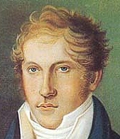The 20th Anniversary of the Maulbronn Monastery Edition
The most beautiful Concert Highlights
from Maulbronn Monastery 2010-2011
The 50th Anniversary of the Maulbronn Monastery Concerts
Anniversary Series, Vol. 12
Highlights from
Spohr: The Last Judgement, WoO 61
(June 12 & 13, 2010)
The concert "The Period of Time" (June 20, 2010):
Schop: O Ewigkeit, du Donnerwort & Lachrimae Pavaen
Telemann: Viola da Gamba Sonata, TWV 41:G6 & Die Zeit, TWV 20:23
Carl Philipp Emanuel Bach: Am neuen Jahre: Er ruft der Sonn und schafft den Mond
The Choral Concert "The Night shines as the Day" (July 3, 2010):
Whitacre: Sleep · Brahms: Guten Abend, gut Nacht (Wiegenlied, Op. 49 No. 4)
The Concert "Concert for Strings, Flute & English Horn" (July 9, 2010):
Tchaikovsky: Souvenir de Florence, Op. 70 · Stephenson: Concerto for Cor Anglais & String Orchestra
The Piano Recital "Grand Piano Masters ~ Dreamscenes" (June 4, 2011):
Schumann: Fantasy Pieces for Piano, Op. 12 · Brahms: Piano Sonata No. 3 in F Minor, Op. 5
Brahms: A German Requiem, Op. 45 ("London Version")
(October 1 & 2, 2011)
Live recordings from the German UNESCO World Heritage Site Maulbronn Monastery
HD Recordings · DDD · Duration: c. 129 Minutes
Digital Album · 24 Tracks · incl. Digital Booklet




